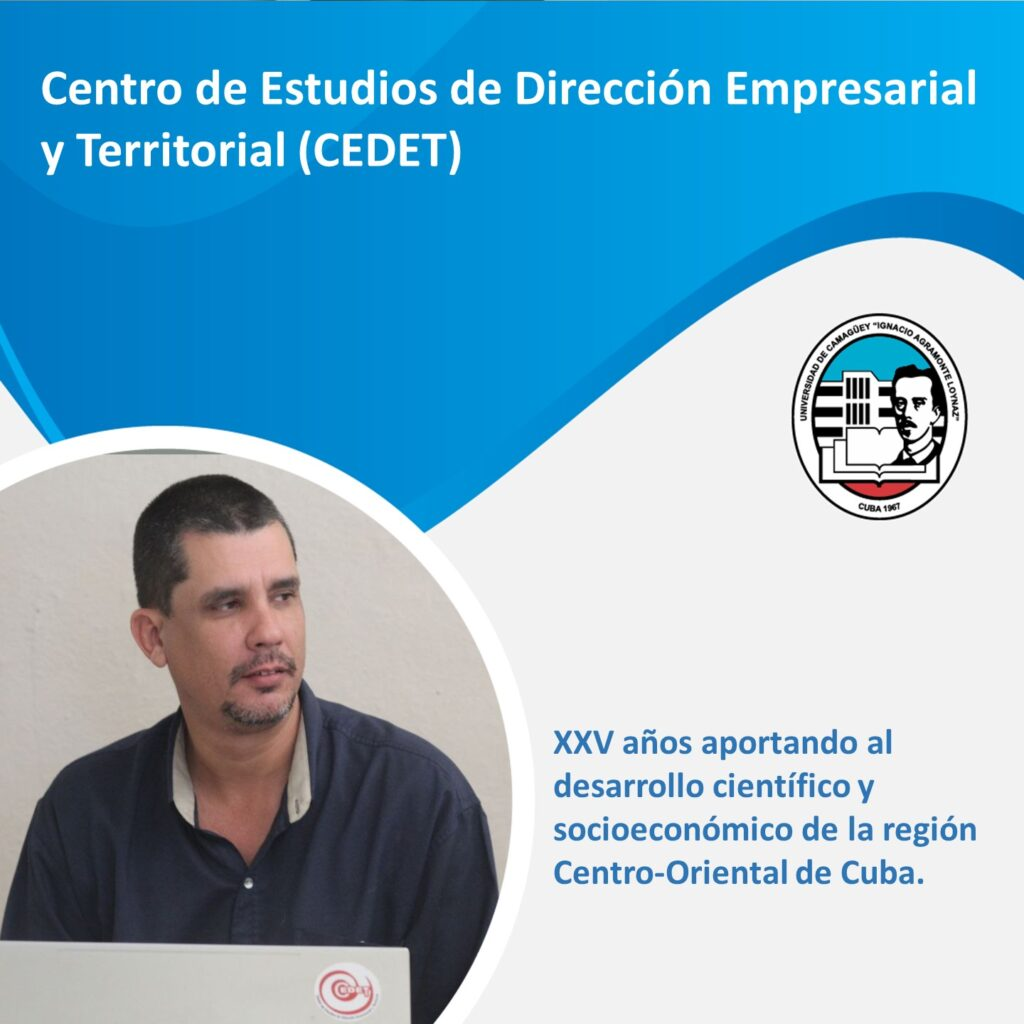
Camagüey, February 21.- The maturity and consolidation of the groups of management techniques, regional development and marketing, international business and political economy, allowed the February 26, 1999, through resolution No. 35/99 of the Minister of Higher Education, the Center for Business and Territorial Management Studies (CEDET in Spanish) of the University of Camagüey (UC) Ignacio Agramonte Loynaz was born.

This entity was one of the first of its kind created in Cuba entirely for research on issues of local management and development, which made Camagüey a leading province in the creation of an entity dedicated to research in these areas and that from science will promote the improvement of business managers and public organizations.
With the mission of promoting the sustainable development of organizations and territories through the improvement of managers, consultancies and methodological advice with high scientific value from the central-eastern region of Cuba, the CEDET arises from the hand of Dr.C. Ramón González Fontes, along with other people such as Dr.C. Eva Perón and Dr.C Néstor Loredo, among others.
“We have coordinated many actions and projects based on the improvement of public and business organizations. A year ago, for example, we closed the FORGEC project, financed by the European Union and with the participation of other Cuban universities, which provided an important group of capabilities, trained personnel, infrastructure and experience in training management capabilities. of entities in Cuba,” explains Dr.C. Ariel Zamora Ferriol, director of CEDET.

“Likewise, we have two sectoral projects. One is aimed at knowledge management for the creation of local productive chains that first impacted the activity of obtaining goat milk in the Jimaguayú municipality. However, today it is aimed at productive chains and capacity building to raise fishing levels specifically in the dam of that territory; as well as the economic and social development of the green ring of the city of Camagüey and the solution to the needs of the population through links with companies.”
The center also registered a very active participation in international projects that allowed the entry of equipment to improve the infrastructure, academic exchange, learning of other ways of doing and preparing business and university managers in Cuba, in management issues, to from the European methodology.
Other projects emerged from the three Postgraduate Programs led by the Center: the Master's Degrees in Regional Management and Development, both evaluated as Certified, and the Doctorate in Economic Sciences, which holds the Category of Excellence, awarded by the National Accreditation Board and which In addition, he opts for the Prize of the Ibero-American University Postgraduate Association.

This Program stands out for the training of professionals from Camagüey, Ciego de Ávila, Guantánamo, Santiago, Holguín, Granma and Las Tunas. Specialists from the academic world and other sectors of the economy have graduated from it and occupy management positions in important companies in the region. In addition, it prioritizes work with the strategic axes according to the needs of each territory.
"At this time we are working on investigations into the use by governments of the information resulting from studies of danger and risks in coastal areas, the marketing activity of the Cuba-Petroleum Union, the trade system, the beverage company and the sector. food. Meanwhile, a thesis on cultural identity was recently defended as a way to manage and influence municipal development strategies,” argues Néstor Loredo Carballo, coordinator of the Doctorate.
The Master's Degree in Regional Development, the first to emerge at the UC, guarantees the preparation and improvement of government officials in the province and directors of territorial development. In the last two editions, it has had presidents and government officials, mayors and vice mayors in its classrooms, who through science and innovation contribute to the new government management model advocated by the country's leadership.
“With this capacity building, we have the challenge of offering municipalities the skills they demand and need to achieve their autonomy, successfully conduct local development, enhance food sovereignty and, through social, economic and cultural independence, grow the territory,” says Zamora Ferriol.

In that sense, the Center has the only UNESCO Chair in Local Development (DL) existing in Cuba and the first created in Latin America. Due to its impact and results, its renewal was approved for a new period in which its members will strengthen the promotion of culture, science and education from the DL.
For its part, the Master's Degree in Management, which is in its 19th edition, constitutes the main academic program that for 24 years has trained more than 600 managers of companies and territorial bodies and the public sector, in topics related to strategic management of organizations.
An important publication underpins its results: Retos de la Gestión, the first scientific journal in Cuba that addresses this aspect and is indexed in the SciELO database. With a rich history and satisfactory results, this volume aims to position itself, between 2024 and 2025, in Group 1, Web of Science or SCOPUS.
https://www.reduc.edu.cu/wp-content/uploads/2024/02/photo_5073324582919843056_y-300x200.jpg?x84346
CEDET does not stop its postgraduate activity there. As a future project, they design a Diploma in Strategic Management in Local Development, from a vision more connected to the real life of the exercise of government, and to create the capabilities of managers who can address the urgent but also the strategic and contribute to a more balanced economy and well-being of the people of Camagüey.
With its 19 specialists, 16 Doctors and three Master's degrees, this Study Center in its 25 years of life has a high level of academic and scientific preparation and training, translated into the sustainability and quality of the faculty, scientific production, participation in national events and foreigners, the insertion in different ways in 24 research projects and above all in the contribution to the scientific and socioeconomic development of Camagüey and Cuba. (Text and photos: Digital Site University of Camagüey Ignacio Agramonte Loynaz)